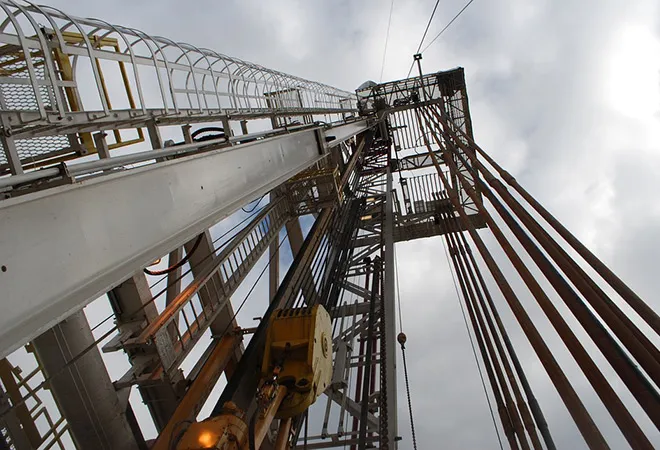With the launch of bilateral India-US energy dialogue in May 2005, energy has been a mainstay of India-US strategic partnership. Ever since both the countries have worked closely in a range of energy portfolios under six working groups, including oil and gas, new technologies and renewable energy and most importantly, civil nuclear cooperation under the 2005 Energy Dialogue.
Under this dialogue, five Working Groups were formed to cover entire gamut of energy cooperation to include, trade and investments in hydrocarbons, electricity generation, cooperation in clean energy technologies, promoting energy efficiency and renewable energy resources and dialogue and actions on the issues to the civilian use of nuclear energy.
Alongside this emerging energy relationship which was marked by signing of historical civil nuclear deal, challenges between the two countries were also observed. Nuclear liability issues and disputes on solar panels, wherein India lost to U.S. in WTO court has been the source of friction between India and the U.S.
However, with President Trump’s ‘An America First Energy Plan’, which is clearly titled towards increased exploration and production of hydrocarbons, including shale oil and natural gas reserves on its federal lands could reset its energy ties with India. Scope for cooperation on clean energy, an essential element of partnership between the two countries under Obama Administration could fade away under Trump regime. Trump administration believes that restriction on extraction and production of fossil fuels and greater importance to clean energy has threatened energy independence of the U.S.
Moreover, it was 2nd shale revolution of the U.S., which not only helped the U.S. to survive low oil price scare through operational efficiency measures but also put it ahead of Saudi Arabia in shaping global oil markets.
The meeting by Petroleum Minister Dharmendra Pradhan with his counterpart Rick Perry hints towards engagement on these lines. The talk therefore, revolved around energy cooperation concerning India’s growing energy needs and how U.S. can cooperate with India towards meeting latter’s energy security goals. In this regard, inter-alia, both the countries explored investment propositions in LNG and shale gas. Towards this end, Pradhan also used his Houston trip for CERA Week event to inform prospective investors about the opportunities in the country due to the policy changes by the Government of India.
This was Pradhan’s second visit to Washington in last eight months, where he met then Energy Secretary Ernest Moniz in June 2016, wherein, development of strategic petroleum reserves was discussed. Both the ministers also agreed to increase technical cooperation in new technologies in development of bio fuel and assessment and reassessment of conventional and unconventional hydrocarbon reserves in both offshore and onshore in India. Further, both the countries also agreed to the need for regular meetings of their officials and experts for progress in cooperation in specified areas.
According to India’s Hydrocarbon Outlook of 2015-16, under upstream exploration and production sector, the active memorandum of understanding (MoUs) signed by India and the U.S.
In December 2008, U.S. an MoU was signed between Geological Survey (USGS) and Directorate General of Hydrocarbon (DGH) for resource exploration hazards and environmental issues associated with gas hydrates, field studies and research for Gas hydrate.
In December 2009, The Minerals Management Service of The Department of the Interior of The United States of America & DGH signed an MoU for leasing/ tendering programs, resource estimation and methane hydrate R&D activities and human resource development. In 2009, both the countries also launched the Partnership to Advance Clean Energy (PACE) to push low carbon growth in India, wherein U.S. Department of Energy committed $25 million from 2011-2016 to support the U.S.-India Joint Clean Energy Research and Development Center (JCERDC). This was strengthened further under Modi-Obama meetings.
In November 2010, Department of State, U.S. & Ministry of Petroleum & Natural Gas, Government of India, signed an MoU, exchange of knowledge and expertise in the areas concerning shale gas resource characterization and assessment in India. In order to improve technical expertise to be used in 17 potential oil and gas well sites along the coast in India, Indian companies such as Reliance Industries, GAIL, Indian Oil Corporation and Indian Oil have invested in U.S. gas projects. For example, in 2011 GAIL bought 20% equity in a project located in the Texas Eagle Ford shale play, while in 2012 OIL and IOC bought a 30% stake in a project located in Colorado’s Niobrara shale oil and gas site.
In 2016, India, along with Government of Japan and the USGS has discovered world’s largest and most concentrated discovery of gas hydrates in Bay of Bengal, which if tapped economically can be a game changer to world’s energy security.
Given Trump’s energy priority under America First Energy Plan tilted more towards hydrocarbons, supported by shale oil and gas boom, it still remains to be seen as to what could be the future of U.S.’s clean energy cooperation with India.
Thus, in an America First Energy Plan, where Trump has planned to invest $500 trillion in untapped shale, oil, natural gas, and clean coal reserves, India would do well to cooperate with the U.S. on natural gas for its low carbon growth, while enhancing its domestic hydrocarbon production. India’s clean energy goals can be explored through its collaboration with the countries in the
Europe and Middle East, thereby resetting its energy ties with the U.S.
This commentary originally appeared in EnergyInfraPost.
The views expressed above belong to the author(s). ORF research and analyses now available on Telegram! Click here to access our curated content — blogs, longforms and interviews.




 PREV
PREV


